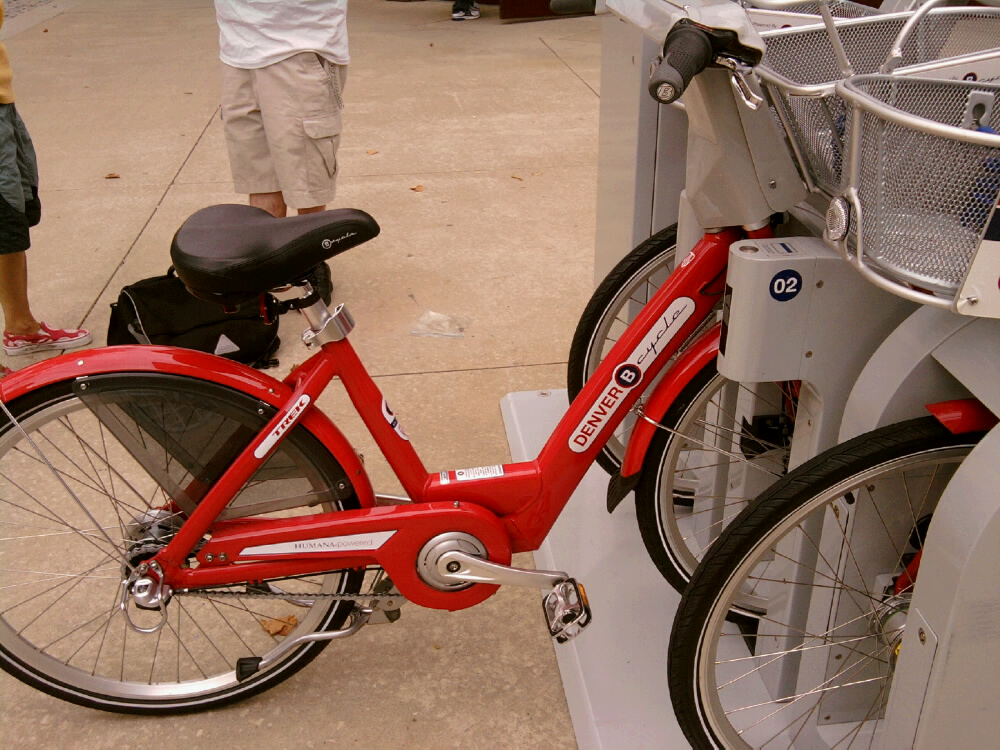Will bike sharing beat SEPTA smart cards to finish line?

Will Philadelphia get bike share before SEPTA gets its smartcard payment system? Chances are it will be a close race.
This week the city released more details about the bike sharing network that it has committed to build, and according to this latest report, the bike sharing system could roll out in late summer 2014. Around that time SEPTA expects to have New Payment Technology (NPT) equipment installed on all buses, trolleys and subways.
The bike share network the city is working on will look similar to systems in cities from Washington, New York and Chicago to Toronto, London, Paris and beyond. At 150 to 200 bike share stations, the city will locate 1,500 to 2,000 bicycles available for short-term rental. A bike picked up from one station can be returned at any of the other stations, given there is space. The idea is that people will be able to use the bikes to commute, run an errand, tour the city or get some exercise.
Mayor Nutter has already committed $3 million in capital budget funding toward bike share, and those leading the endeavor expect building the bike share network to cost $10 million to $15 million. The remaining funding is expected to come from state and federal transportation grants as well as some private funds. Once the system is up and running it is expected to be self sufficient and will not require any public operating subsidy.
According to a press release issued by the city on Thursday, Philadelphia’s bike share is projected to generate nearly 2 million trips per year with residents, commuters, students and visitors taking part. Thousands of users are expected each day.
“We’ve seen bike sharing work amazingly well in other cities, but we know that we have to tailor our system to meet the needs of Philadelphians,” Deputy Mayor for Transportation and Utilities Rina Cutler said in the release.
At this point the city has completed the Philadelphia Bike Share Strategic Plan and is now asking for expressions of interest from businesses, organizations and people looking to host or sponsor some of the 1,500-plus bike share stations. These expressions of interest are non-binding and intended to help the city plan bike share locations.
The stations will be located throughout the city from the Delaware River west into West Philly and from The Navy Yard north beyond Temple University’s main campus.
Interested parties can step forward as potential station sponsors or station hosts. Station sponsors will underwrite the cost of one or more bike stations on or near their property, and station hosts will offer to place a station on or near their property. Already, Brandywine Property Trust, the University of Pennsylvania, GlaxoSmithKline and Liberty Property Trust have indicated that they would like to sponsor or host stations. Others who want to express interest can do so on a new clickable map available through the city’s bike share website.
“Sponsoring and hosting a bike share station at the Cira Centre and our other properties in Philadelphia is an obvious business decision,” Jerry Sweeney, CEO of Brandywine Property Trust, said in the press release. “Property owners who are serious about providing transportation options and quality amenities to their tenants are going to support bike share.”
“More bikes on the street is going to mean more safety because of more awareness of bikers on the street,” said Jeannette Brugger a city planner at the Philadelphia City Planning Commission (PCPC).
PCPC has not been involved in developing the bike share program thus far, but Brugger said PCPC plans on coordinating with the Mayor’s Office of Transportation and Utilities (MOTU) on locations “and by way of the district planning process to kind of institutionalize some of the things they are planning.”
PCPC played a large part in developing the Philadelphia Bicycle and Pedestrian Plan, which was released in 2012 and included bike sharing as a major recommendation.
The current bike share business plan was completed by Toole Design and Four Square Integrated Transportation Planning in cooperation with the Pennsylvania Environmental Council, Bicycle Coalition of Greater Philadelphia, the Delaware Valley Regional Planning Commission and a business advisory group. Funding for this effort was provided by the William Penn Foundation. MOTU is overseeing the bike share development process.
[Full disclosure: PlanPhilly is a product of PennPraxis, the applied research arm of the University of Pennsylvania’s School of Design. PlanPhilly receives funding from the William Penn Foundation]
WHYY is your source for fact-based, in-depth journalism and information. As a nonprofit organization, we rely on financial support from readers like you. Please give today.



